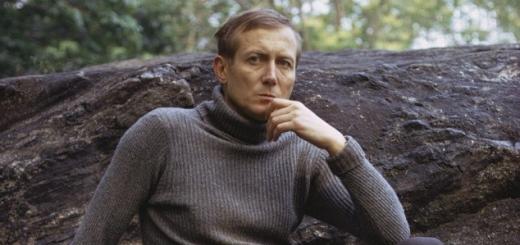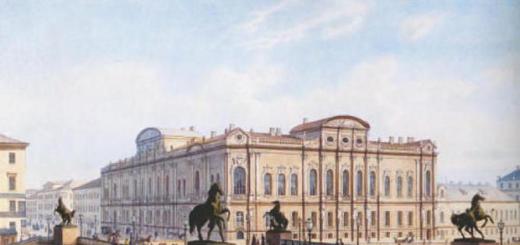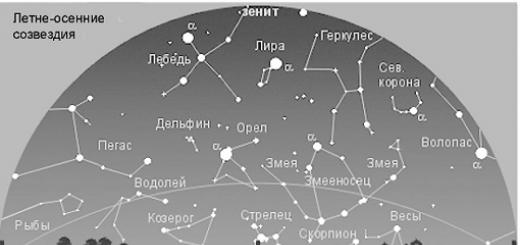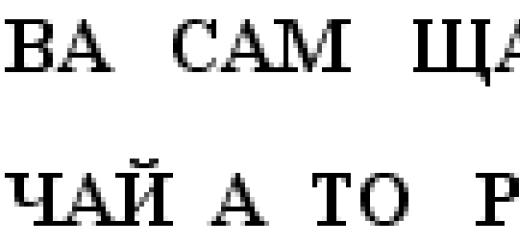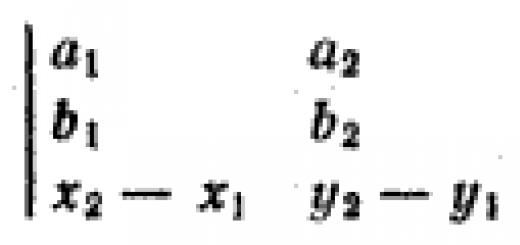From Greek. theme (the basis of the plot of the work).
intimate lyrics
M.Yu. Lermontov "She is not proud beauty ..."
B.L. Pasternak "Winter Evening".
landscape lyrics
A.A. Fet "Wonderful picture ..."
S.A. Yesenin "behind the dark strand of woods ...".
friendship lyrics
B.Sh. Okudzhava "An old student song".
The theme of the poet and poetry
M.I. Tsvetaeva "Roland's Horn".
Patriotic and civil lyrics
ON THE. Nekrasov "Motherland"
A.A. Akhmatova "I am not with those who abandoned the earth ..."
Philosophical lyrics
F.I. Tyutchev "The Last Cataclysm"
I.A. Bunin "Evening".
The most important character in the lyrics is lyric hero: it is his inner world that is shown in the lyrical work, on his behalf the lyric artist speaks to the reader, and the external world is depicted in the context of the impressions that he makes on the lyrical hero. Note! Do not confuse the lyrical hero with the epic one. Pushkin reproduced in great detail the inner world of Eugene Onegin, but this is an epic hero, a participant in the main events of the novel. The lyrical hero of Pushkin's novel is the Narrator, the one who is familiar with Onegin and tells his story, deeply experiencing it. Onegin only once becomes a lyrical hero in the novel - when he writes a letter to Tatyana, just as she becomes a lyrical heroine when she writes a letter to Onegin.
By creating the image of a lyrical hero, the poet can make him personally very close to himself (poems by Lermontov, Fet, Nekrasov, Mayakovsky, Tsvetaeva, Akhmatova, etc.). But sometimes the poet seems to be "hiding" behind the mask of a lyrical hero, completely far from the personality of the poet himself; so, for example, A Blok makes Ophelia a lyrical heroine (2 poems called "Ophelia's Song") or a street actor Harlequin ("I was all in colorful rags ..."), M. Tsvetaeva - Hamlet ("At the bottom she, where silt ... "), V. Bryusov - Cleopatra ("Cleopatra"), S. Yesenin - a peasant boy from a folk song or fairy tale ("Mother went to the bathing suit through the forest ..."). So it’s more literate, when discussing a lyrical work, to talk about the expression in it of the feelings of not the author, but the lyrical hero.
Like other types of literature, poetry includes a number of genres. Some of them arose in ancient times, others - in the Middle Ages, some - quite recently, one and a half to two centuries ago, or even in the last century.
motive
From the French motif - lit. traffic.
Stable formal-meaningful component of the work. Unlike the topic, it has a direct verbal fixation in the text. Identification of the motive helps to understand the subtext of the work.
The motives of struggle, flight, retribution, suffering, disappointment, longing, loneliness are traditional in the lyrics.
keynote
Leading motif in one or many works.
The motif of exile in the poem by M.Yu. Lermontov "Clouds".
The motive of loneliness in the early lyrics of V.V. Mayakovsky.
Bibliography.
Lyrics (from the Greek lyga - a musical instrument, to the accompaniment of which poems, songs, etc. were performed), one of the three types of fiction (along with the epic and drama), within which the attitude of the author (or character) is revealed as direct expression, outpouring of his feelings, thoughts, impressions, moods, desires, etc.
Unlike epic and drama, which depict complete characters acting in various circumstances, lyrics depict individual states of character at a certain moment in life. A lyrical image is an image-experience, an expression of the author's feelings and thoughts in connection with various life experiences. The range of lyrical works is unlimited, since all the phenomena of life - nature and society - can cause corresponding human experiences. The peculiarity and power of the influence of the lyrics lies in the fact that it always, even if it is about the past (if it is memories), expresses a living, immediate feeling, an experience experienced by the author at the moment. Each lyrical work, no matter how limited in size it may be, is a complete work of art, conveying the internally completed state of the poet.
The increased emotionality of the content of a lyrical work is also associated with the corresponding form of expression: lyrics require concise, expressive speech, each word of which carries a special semantic and emotional load, lyrics gravitate towards poetic speech, which contributes to the expression of the poet's feelings and a stronger emotional impact on the reader.
The lyrical work captures the personal experiences of the poet, which, however, are characteristic of many people, generalize and express them with the power inherent in poetry.
In a lyrical work, through the personal, the poet conveys the vital, the typical. Lyrics, like other types of fiction, develops under the influence of historical conditions, social struggle, causing people to express their attitude to new phenomena, their experiences associated with them. Lyrics, of course, is connected with the entire literary process, in particular with the change of various literary trends, trends and methods: classicism, romanticism, critical realism.
The heyday of lyrics occurs in the era of romanticism.
It is characteristic that in many countries it was during this era that the work of great national poets took shape (Mickiewicz in Poland, Hugo in France, Byron in England, Pushkin, Lermontov, Tyutchev in Russia).
Types and themes of lyrics
There are various classifications of types of lyrics.
They are classified by subject:
Philosophical (“God” by G. R. Derzhavin, “The Inexpressible” by V. A. Zhukovsky, “Vain Gift, Random Gift” by A. S. Pushkin, “Truth” by E. A. Baratynsky, “Fountain” by F. I. Tyutchev)
civil (“To Chaadaev” by A.S. Pushkin, “Farewell, unwashed Russia” by M. Yu. Lermontov, “Testament” by T. G. Shevchenko, “Reflection at the front door” by N. A. Nekrasov, “Readers of newspapers » M. Tsvetaeva, “Midnight in Moscow” by O. Mandelstam, “Russia” by A. A. Blok, “Poems about the Soviet passport” by V. V. Mayakovsky, “The torn base of the monument is crushed” by A. T. Tvardovsky)
Landscape (“Autumn Evening” by F.I. Tyutchev, cycles “Spring”, “Summer”, “Autumn”, “Snow” by A.A. Fet, “Green Hairstyle”, “White Birch” by S.A. Yesenin)
love (“I loved you” by A.A. Pushkin, “I don’t like your irony ...”, “Yes, our life flowed rebelliously ...”, “So this is a joke? My dear ...” N.A. Nekrasova)
Political (“Napoleon”, “As a daughter to the slaughter ...” F.I. Tyutchev), etc.
However, it must be borne in mind that, for the most part, lyrical works are multi-dark, since various motives can be reflected in one experience of the poet: love, friendship, civic feelings (cf., for example, “I remember a wonderful moment”, “October 19, 1825” A. Pushkin, “In Memory of Odoevsky”, “I am writing to you ...” by M. Lermontov, “Knight for an Hour” by N. Nekrasov, “To Comrade Nette ...” by V. Mayakovsky and many others). Reading and studying the lyrics of different poets of different eras greatly enriches and ennobles the spiritual world of a person.
The following lyrical genres are distinguished:
· Ode - a genre that sings of some important historical event, person or phenomenon. This genre was especially developed in classicism: "Ode on the day of accession to the throne ..." by M. Lomonosov.
· Song - a genre that can refer to both epic and lyrical genres. The epic song has a plot: “The Song of the Prophetic Oleg” by A.S. Pushkin. The lyrical song is based on the emotional experiences of the protagonist or the author himself: Mary's song from A Feast in the Time of Plague by A.S. Pushkin.
Elegy - a genre of romantic poetry, the poet's sad reflection on life, fate, his place in this world: "The daylight went out" by A.S. Pushkin.
Message - a genre that is not associated with a particular tradition. A characteristic feature is the appeal to some person: "To Chaadaev" A.S. Pushkin.
· Sonnet - a genre that is presented in the form of a lyrical poem, characterized by strict requirements for form. A sonnet should have 14 lines. There are 2 types of sonnet: English sonnet, French sonnet.
An epigram is a short poem, no more than a quatrain, which ridicules or presents in a humorous form some individual person: “On Vorontsov” by A.S. Pushkin.
· Satire - a more detailed poem, both in terms of volume and scale of the depicted. Usually ridicules social failings. Satire is characterized by civic pathos: Kantemir's satires, “My ruddy fat-bellied mocker ...” A.S. Pushkin. Satire is often referred to as epic.
Such a division into genres is very conditional, because they are rarely presented in their pure form. A poem can combine several genres at the same time: "To the Sea" by A. Pushkin combines both an elegy and a message.
The main form of lyrical works is a poem, but it should be remembered that lyrics also exist in prose: these are inserted lyrical fragments in epic compositions (such are some extra-plot elements of N.V. Gogol's Dead Souls), and isolated lyrical miniatures (some from "Poems in Prose" by I. S. Turgenev, many stories by I. A. Bunin).
He was a great poet of the nineteenth century. He left behind a huge legacy, where a special place can be given to lyrics. In general, the writer worked in the era of romanticism, which could not but be reflected in his works. However, the poet managed to supplement each poem with his own vision, which made his poems special. In his work, Lermontov covered a variety of topics, many of which are still relevant today.
Themes and motifs of Lermontov's lyrics
Lyrics of Lermontov, its main themes and motives, the writer directed in search of spirituality, in the fight against society, which was opposed to him. He tried to philosophize, thinking not about the meaning of life, the relationship between nature and man, he also touched on the topic of loneliness. If we talk very briefly about Lermontov's lyrics, then he wrote on different topics, and his poems differed in mood. However, all of them can be mentally divided into categories, where several directions will be characteristic.
Early lyrics by Lermontov
The poet began to try his hand at the literary field at an early age. Despite the variety of genres of his works, the basis of his work was the lyrics. Here it is worth noting precisely the early lyrics of Lermontov, which at first had an imitative character. And this is understandable, the writer is only learning, and looking at his predecessors, he takes an example from them. But at the same time, he does not follow established traditions, but tries to rethink everything and give the reader his vision, touching on important topics and motives in his lyrics.
In the early lyrics, Lermontov is seen as a romantic person, where his creative works were a kind of diary of a person who is trying to know himself. In his early work, Lermontov touches upon problems of a socio-historical nature, and in his works we see a patriotic beginning that is just beginning to be laid in the poet. An example of this is the verse I saw the shadow of bliss. In addition, at the initial stage of his writing activity, the poet touches on the theme of love, where Lermontovsky stands out. The stage of the poet 's early lyrics ends with his poem .
Love lyrics by Lermontov
Among the themes revealed in Lermontov's lyrics, one can single out the theme of love. However, when reading the works of the poet, sadness arises. After all, all his love lyrics are filled with pessimistic notes. Lermontov has a lot of poems about love, but this love is not mutual, and for the heroes of his poems about love, love itself and the concept of love are different. If for the lyrical hero everything is serious and he is ready to surrender to a wonderful feeling, then for the heroine this is just another affair. An example of this is the verse Cupid's Delusion. In general, Lermontov's love poems can be listed for a long time. All of them make up the writer's love lyrics and they are all contradictory. On the one hand, we see hope, but in the end it is replaced by motives of loneliness and disappointment.
Philosophical lyrics of Lermontov
Whatever topic the poet touches on, whatever motive he chooses, philosophical reflections were still the main direction of his work. Here one can trace arguments about being, God, about the freedom and captivity of man, and the meaning of life. Lermontov is trying to understand the theme of death, to reveal and understand the theme of love feelings and much more. The philosophical lyrics of Lermontov are aimed at the struggle of two principles, at the search for harmony, at the disclosure of the themes and motives of faith and disbelief.
Motherland in Lermontov's lyrics
In his works, the writer did not pass by the theme of the Motherland. He touched her, like many other Russian writers. In his poems, the poet contrasts the Motherland with the state and declares that the political system with its rotten schemes of government is unacceptable to him. He calls Russia a country of slaves and masters. However, Lermontov loved his homeland. With its nature, landscapes, originality. This love is also felt in the poem Motherland or Russian Melody.
The whole possible range of topics of written works on lyrics can be reduced to three types.
| Theme type. | Examples of essay topic wording |
|
| I. "Through" theme. | The theme of the poet and poetry in the lyrics of Pushkin and Nekrasov. The image of the motherland in the lyrics of the poets of the Silver Age. The theme of love in Russian lyrics of the 19th century. |
|
| Theme, motives, problems, image of the lyrical hero, artistic originality, etc. | The theme of friendship in Pushkin's lyrics. Philosophical motives of Lermontov's lyrics. The problem of the people in the lyrics of Nekrasov. The originality of the lyrical hero Blok. Russian nature in Yesenin's lyrics. |
|
| III. Analysis of one lyrical work. | Text research poems in the unity of content and form in the context of the author's work and Russian poetry in general. | The ideological and artistic originality of Lermontov's poem "I go out alone on the road ...". Analysis of Nekrasov's poem "The heart is torn from flour ...". Blok's poem "The Stranger". (Perception. Interpretation. Evaluation.) |
Features of disclosure of each type.
| Theme type | Disclosure Features | Possible errors and shortcomings |
| I. Cross-cutting theme. | It is necessary to have an idea of the literary process as a whole. The main thesis in the introduction should be formulated succinctly and accurately. The selection of material, including cited material, should be carried out with particular care, relying on the logic of comparison given by the topic and the main thesis. The conclusion should be specific and definite. | The vague formulation of the main thesis entails a “loose” composition, a digression from the topic. The abundance of quotes leads away from the main idea. The absence of a conclusion nullifies the author's efforts to reveal the topic. |
| II . According to the lyrics of one author. | The starting point should be an understanding of the author's worldview, the evolution of his work, an understanding of the originality of his style. | The "blurring" of ideas about the originality of the author's work leads to an abundance of general phrases, the predominance of emotional assessments to the detriment of analysis. |
| III. Analysis of one poem. | It is necessary not only to know the author's work in the context of the literary process, but also to be able to use literary terminology, to master the techniques of literary analysis of a poem as a lyrical work. | Failure to understand the generic specifics of lyrics, the figurative nature of the artistic word entails a retelling of the text or a primitive commentary; the lack of the ability to analyze can be expressed in the enumeration of artistic features in isolation from the ideological meaning. |
III. Analysis of one poem.
Topic comments may contain the following words:perception, interpretation, evaluation. Consider their meaning in the context of the topic.
| Perception | It can be about your personal intellectual and emotional perception of the poem. You can write about what kind of response this work found in you, what thoughts and feelings it aroused. Also, we can talk about the perception of the poem by the author's contemporaries, his like-minded people and opponents, critics, literary critics, composers, artists. |
| Interpretation | Interpretation is the analysis of the poem in the unity of its content and form. It is necessary to analyze the poem taking into account the context of the author's work and Russian poetry in general, as well as the originality of the lyrics as a kind of literature. The essay may contain references to the interpretation of the poem by literary critics, a comparison of different points of view. |
| Grade | Grade - these are comments about one or another side of the skill of the author of the poem and a conclusion about the artistic value of the text under study, the place of the work in the author's work, and literature in general. Evaluation is both the points of view (evaluations) of other authors and your own opinion, formed in the process of analyzing the work. |
Analysis of the elegy of A.S. Pushkin "The light of the day went out"
One of the brightest works of A.S. Pushkin - romanticelegy "The light of day went out." It was written in 1820when romanticism reached its peak. A.S. Pushkin, like manyother poets became interested in this creative method. But he didn'tadhere to the type of "Byronic" popular at that timehero" and significantly changed this image. After analyzing this work, we will see how the romantic hero A.S. Pushkin from the hero J. Byron.
The elegy tells about the experiences and memories of the lyrical hero traveling by sea (“I strive there with excitement and longing, intoxicated with memories”). Here the poet touches on the problem of the relationship between man and society. The idea is that disappointment in society leads to loneliness (“I fled you, pets of pleasure, momentary youth friends”). The fun of society is opposed to loneliness (“and you are forgotten by me,< ...>secret friends of my golden spring"), joy - to suffering ("... light-winged changed my joy and betrayed my cold heart with suffering ...")
The poem consists of three parts, different in size and separated by a short refrain: "Noise, noise obedient sail, Worry under me, gloomy ocean." The first part, consisting of only two lines, is a landscape, that is, it takes the reader to where the lyrical hero is. Ten lines of the next part are devoted to describing the feelings of the lyrical hero: "tears were born in the eyes again." Further, he recalls his first love (“feelings flared up with the flame of passions for the first time ...”), the people with whom he communicated: “minute youth of minute friends”, confidantes with whom “without love he sacrificed himself.” This takes up twenty-two lines. Such a sharp increase in the size of each part emphasizes the growing excitement, anxiety, an ever greater immersion in the world of memories. At first, the lyrical hero speaks simply about “the previous years of crazy love”, then about “the country where feelings flared up with the flame of passions for the first time”, and finally it becomes known that “nothing has healed the former heart wounds, the deep wounds of love.”
Sad, even sad mood, excitement, emotional experiences are vividly drawn thanks to the many tropes used by the author in the elegy: epithets (“magic edges”, “languishing deceit”, “obedient sail”, “according to the terrible whim of the deceptive seas”, “light-winged joy” ), metaphors (“tears were born”, “the soul boils”, “the flame of passions”), personifications (“the dream flies”). There are periphrases: “pets of pleasures”, “confidantes of vicious delusions”, which reveal the thoughts of the lyrical hero about his social circle, and rhetorical appeals: “noise, noise, obedient sail”. The refrain repeated three times resembles the slow oscillation of the waves of the ocean. The repeated use of the allied word “where” and the repetition of the phrases “and you are forgotten by me”, “I fled you” create the impression of a constant return to memories, strong excitement when a person forgets and again says the words already spoken.
The main means of expressiveness is the symbol: "The daylight went out, the blue evening mist fell on the sea." Identification with darkness is characteristic of sad events, and we understand that some kind of misfortune has occurred in the life of the lyrical hero. The “gloomy ocean” most likely symbolizes the human soul, as it is similar to it in its unpredictability and depth. The surging ocean is compared to a soul full of despair and suffering.
The abundance of vowels gives speech a resemblance to the fluctuation of sea waters. In some lines there is a sound writing: “noise, noise, obedient sail” - the repeating sound [w] reproduces the noise of the wind. In the sentence “where the light-winged one changed my joy ...” there are many sonorous sounds [l] and [r], due to which one feels the lightness and melodiousness of the speech of a person who recalls the happiness he once experienced.
The lexical set corresponds to the disturbing intonation of the elegy: “extinguished”, “worry”, “gloomy”, “with excitement and longing”, “crazy love”, “everything I suffered”, “on a terrible whim”. The theme of suffering resounds in all these words. Words of high stylistic coloring enhance the gloomy solemnity of the picture: “youth”, “cold”, “golden” instead of “golden”. Free iambic and lines of unequal size create a speech that is as close as possible to a living language. The free nature of the rhyme (adjacent, cross and encircling) in combination with the alternation of feminine and masculine rhymes enrich the intonation.
The swiftness of the coming memories and the anxiety in the artist's heart are emphasized by the abundance of verbs that give dynamism to the narrative: "extinguished", "fallen", "noise", "worry", "fly". Verbs appear in almost every line.
The elegy is written in compound sentences, consisting of short simple sentences, and compound sentences with homogeneous subordinate clauses: “... countries where feelings flared up with a flame of passions for the first time, where gentle muses secretly smiled at me, where my lost joy faded early in storms...” . Such an abundance of proposals, complicated by an abundance of homogeneous members, contributes to forcing the mood of despair and anxiety characteristic of romanticism.
Despite the fact that this elegy is a romantic work, the lyrical hero cannot be called "Byronic". He, like the hero of Byron, is lonely, a deep spiritual wound made him become disillusioned with society and leave his native country: “fly, ship, carry me to the distant limits<...>but not to the sad shores of my foggy homeland. But in the lyrical hero of the elegy A.S. Pushkin does not have such cruel egoism as in the characters in the works of J. G. Byron. On the contrary, he sincerely regrets both "minute friends and secret girlfriends", whom he did not really love. Loneliness for him is a courageously experienced, personal tragedy, and not a reason to take revenge on the whole world. This humanism has become a hallmark of all the work of A.S. Pushkin. Subsequently, humanistic pathos became the leading feature of all Russian literature.
